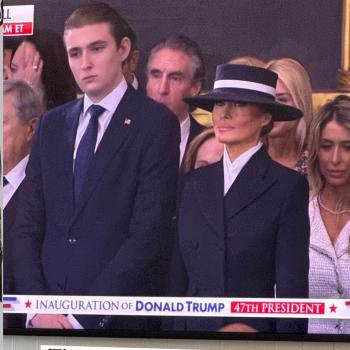If the last eight years have shown anything, they’ve shown that the media, academics, religious leaders, and think tanks can collectively render Donald Trump profane, but they cannot make him less popular. Still, they try. Theologian Wayne Grudem, over on the Christian Post, offers ten reasons to vote for Ron DeSantis, one of which is: “Trump fatigue.” Over at Christianity Today, at this late hour (8pm CT), the leading story is still a piece that asks whether another influential Iowan leader can sway the evangelical vote away from Trump.
Bob Vander Plaats, the article explains, “is head of The Family Leader, an Iowa-based conservative Christian nonprofit with ties to Focus on the Family. He has built up a winning streak picking out the past three GOP caucus winners in his state—Mike Huckabee in 2008, Rick Santorum in 2012, and Ted Cruz in 2016—and holds one of the most-coveted Republican endorsements… Bob Vander Plaats is a kingmaker.” All this fall, Vander Plaats has been trying to crown DeSantis king.
But neither Vander Plaats or Grudem is in a position to deny Trump the primary. (It will take legal maneuvering to do that work; it’s not clear how the Supreme Court will come down in a case meant to deny Trump a spot on state ballots.) At the time of this writing, Trump has been declared the winner of the Iowa caucuses, with 52% of the vote–“even as he faces 91 felony charges in fou r criminal cases that have sidelined him at times from the campaign trail.”
r criminal cases that have sidelined him at times from the campaign trail.”
The news from Iowa tonight confirms Trump hasn’t lost his touch with evangelicals.
“Trump won the Iowa Republican caucuses with strong support from White evangelicals and very conservative voters — key voting blocs in these caucuses — and groups he lost in 2016 when voters were less convinced of his conservative credentials, according interviews with caucus-goers as they went in.”
Political scientist Ryan Burge is right to ask just how religious the religious voters of Iowa are. Consider that, in addition to winning evangelicals, Trump won most other groups too. “Trump’s support was widespread: he won men, women, older voters and younger voters, and improving on his 2016 performance with all of these groups. Most Iowa caucus goers largely dismissed Trump’s legal woes with most saying he would still be fit for the presidency even if he were convicted of a crime.” The NYT estimates Trump will win all 99 of Iowa’s counties– in 2016, he won just 37. If Trump won so many categories, all counties, what makes a voter a religiously motivated voter for Trump? Does religion matter?
Burge is also right to question just how religious the Iowa caucuses are, since many of the “evangelicals” who voted for Trump rarely darken the doors of a church. Perhaps the Iowa vote for Trump is an irreligious one?
Even if Trump has just handily won an irreligious vote, I wouldn’t draw hasty conclusions about Trump’s comparative possible weakness with religious voters or the irrelevance of religion in the 2024 campaign season. No, instead, I think that current political strife will make religion matter more now than in Trump’s prior campaigns and, moreover, I suspect the war in Gaza would readily be played to Trump’s advantage.
First, War in Gaza will readily yield a strong set of talking points for Trump. He will want to talk about the Abraham accords; he might have seen Jordan Peterson say he deserved a Noble Peace Prize for this diplomacy!– he would bring this up. Trump will want to celebrate his efforts and complain about his haters; he will lament that there were things he could do that Biden cannot. He will point out that he did not, as so many expected he might, start this war. Altogether, Trump will welcome the war as an opportunity to frame himself as a successful politician.
More importantly, war in Gaza will also give Trump an opportunity to reframe himself as an agent of God in a very troubled world. Back in 2018, historian Leah Payne (see her new book) and I pointed up that: “Trump’s moving the U.S. Embassy to Jerusalem is not just fulfilling a campaign promise; to many Pentecostal-Charismatics, it’s fulfilling God’s plan for the end of days.” In 2024, Trump is even more likely to be perceived as God’s chosen vessel to aid Israel against her many enemies– now that Israel is at war and facing backlash in the UN. Evangelical zionists have long been expecting global warfare and extensive political contest over the land of Israel, and this before the return of Christ to rule the earth. It’s their sacred narrative; it’s literally how their story ends. The pressure of this long-standing apocalyptic narrative on the evangelical imagination simply can’t be overstated, especially during times of unrest in the Middle East. If he’s able to run, look for Trump to be cast, again, as an anointed leader.

In such a narrative, Trump looks decidedly orthodox. He’s always been a friend of Israel. It’s late in the day and early in the campaign season, so it’s too soon to tell where 2024 will take us, or where it will land Trump. But in both Iowa and Israel, all signs point to our still being on Trump time.
`













